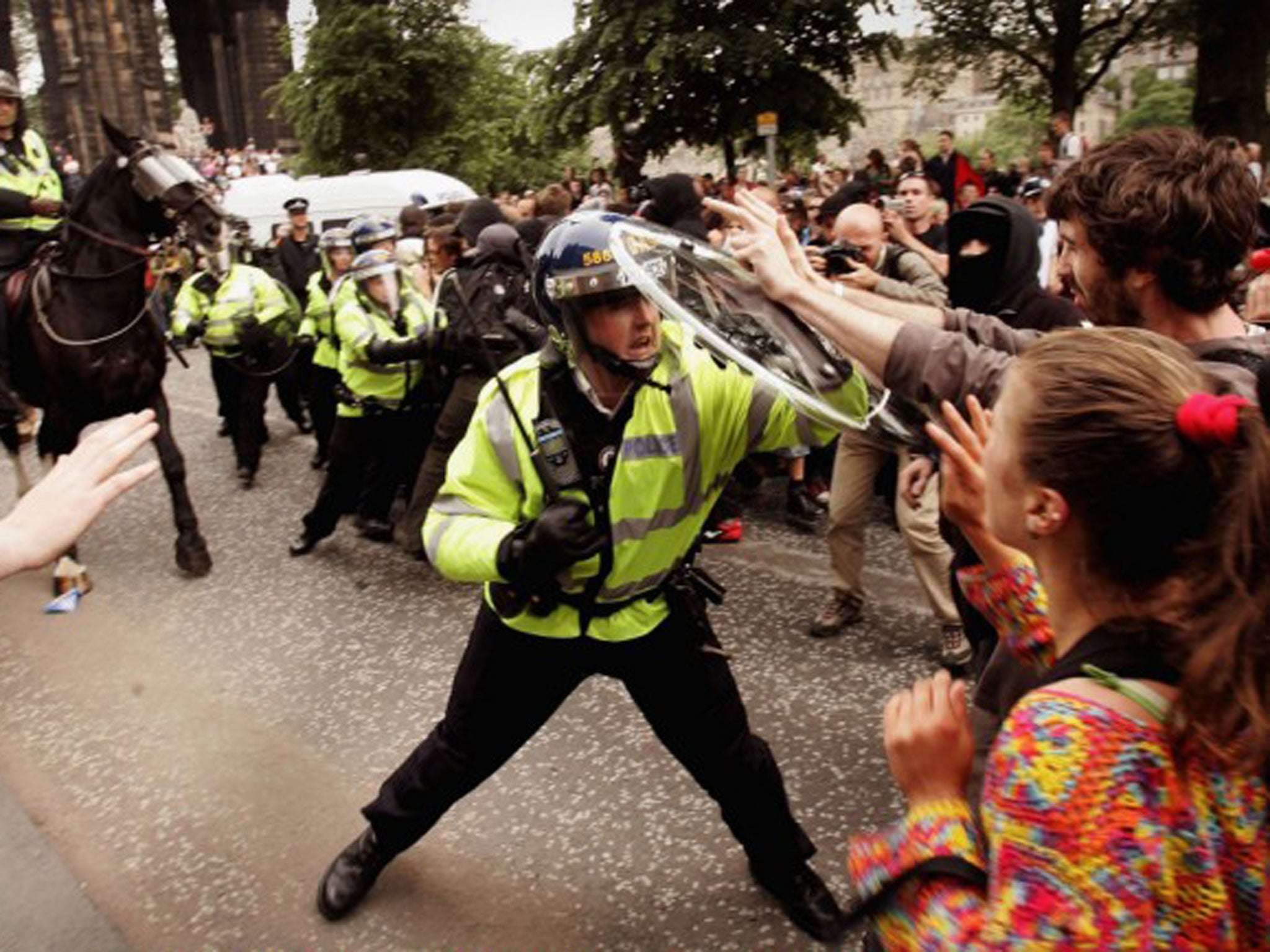What did the year of Live 8 change?
The optimistic zeal for reform before the UK’s last G8 was so strong that even Pink Floyd were prepared to be conciliatory. Sarah Morrison assesses the actual results

It was the biggest anti-poverty movement of our time. More than 200,000 people marched through Edinburgh before the G8 summit in Gleneagles. Hundreds of protesters clashed with riot police, anti-capitalist slogans were sprayed, and dozens of people were arrested.
As leaders including Tony Blair, George Bush and Jacques Chirac prepared to make grand pledges, entertainers such as Bono, Bob Geldof and Paul McCartney garnered support. Eight million people wore the white wristbands, three billion tuned in to watch Live 8 concerts, and Pink Floyd played together for the first time in almost a quarter of a century.
The promises were grand. Increase aid by $50bn a year by 2010 and double what we give to Africa. Bring about trade justice and cancel outstanding debt for the world’s poorest countries. But eight years later, and days before the UK hosts the G8 summit again, The Independent wants to know just how far have we come?
“Of course, we didn’t make poverty history,” said David Bull, executive director of Unicef UK, when asked about the $19bn aid shortfall, the failure to provide universal access to anti-retroviral drugs, or the stark collapse of meaningful trade talks. But, he added, “a lot was achieved in eight years”. Thirty-five countries had their debt cancelled to the tune of $35.5bn, helping Zambia to provide universal healthcare, and countries such as Uganda, Ghana, Malawi and Tanzania to abolish fees for primary school. “Then and now feel like very different eras,” said Europe executive director for ONE Adrian Lovett, who was integral to the Make Poverty History campaign. Indeed, with recession and austerity measures sweeping Europe, the first big hurdle this week will be to get the development agenda heard at all.
The big focus, argued the IF campaign, must be on battling global hunger – malnutrition is the leading cause of child death, yet less than 0.4 per cent of global aid is spent on it. Leaders must invest in agriculture, prevent farmers being forced off land and tackle global tax avoidance, experts warn.
But Brendan Cox, director of policy and advocacy at Save The Children, said people have to manage their expectations. “The G8 sends very strong political signal changes to policy and practice,” he said. “[But] you can’t sue it if it doesn’t do what it says it will.”
The Gleneagles promises: How did we do?
1 Aid
G8 leaders promised to increase annual aid to poor countries by $50bn and to Africa by $25bn by 2010, while the EU committed to spending 0.7 per cent of income on aid by 2015. Targets were not met. Aid increased by more than 35 per cent, but there was a shortfall of about $19bn. Africa received only $11bn more aid – under half of what was pledged. The UK reached the 0.7 per cent target, but Europe remains off-track. 5/10
2 Debt deal
The G8 agreed that 39 heavily indebted poor countries could abandon debts owed to the World Bank, the IMF and the African Development Bank. Thirty five countries have had a total of $35.5bn forgiven. The others are in varying stages of the process. 8/10
3 Trade
The G8 promised to secure an “ambitious and balanced conclusion to the Doha Round” which sought to make trade work for Africa. The broad failure to create a better trade environment for African countries is one of the most clearly missed Gleneagles commitments. But aid for trade to sub-Saharan Africa has almost doubled since 2005. 1/10
4 Health
Leaders committed to “mobilise” funds for the Global Fund to Fight Aids, TB and Malaria and have provided more than 70 per cent of the fund’s resources to date. But the G8 failed on its ambitious goal to deliver universal access to anti-retroviral drugs by 2010 to achieve an Aids-free generation: only 47 per cent of people were receiving treatment by the deadline. But coverage has increased and new infections in some sub-Saharan African countries have dropped by 37 per cent. 6/10
5 Education
G8 leaders committed to “support” African countries to ensure that by 2015 all children have free and compulsory primary education. Sub-Saharan Africa is not on track to meet this target, but 21 million more children are enrolled in primary schools across high-performing countries compared with 2005. Aid for primary education has increased by about two-thirds. 5/10
6 Water and Sanitation
Leaders agreed to increase aid and maintain “political momentum” on the water issue. Average annual aid has increased by more than 70 per cent, but the leaders’ total share of donor aid has decreased. Sub-Saharan Africa is not on track to achieve the Millennium Development Goal target on water and sanitation. 4/10
7 Governance
Leaders promised to fight corruptionand increase support to the extractive industries. Since 2007, five of the G8 countries, including the UK, provided more than $9.1m to the Extractives Industries Transparency Initiative. All but two G8 countries – Germany and Japan – have ratified the UN Convention against Corruption. The Africa Peer Review Mechanism, to self-monitor governance, was set up in 2005, but only two G8 countries have provided bilateral funds. 3/10
Sources: ONE, Oxfam, OECD, GOV.UK
Join our commenting forum
Join thought-provoking conversations, follow other Independent readers and see their replies
Comments
Bookmark popover
Removed from bookmarks